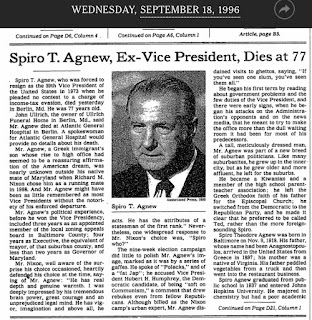Spiro Agnew's Ghost | @SpiroAgnewGhost
In the vast realm of Twitter, where thoughts and opinions converge, one intriguing account stands out among the political chatter—Spiro Agnew's Ghost. With curiosity piqued by our readers' inquiries and comments, we delve into the enigmatic world of Spiro Agnew's Ghost, exploring the origins, impact, and peculiarities of this online persona.
The Origin Story
Emerging onto the Twitter scene in February 2014, Spiro Agnew's Ghost quickly garnered attention for its incisive political commentary. The account's popularity stems from its unique approach to critiquing significant issues, often offering a critical lens on prevailing matters. As of now, this digital specter boasts an impressive following of 142k, with a tweet count that stands at 215.8k—a testament to its enduring relevance and resonance.
The choice of the profile and cover photos is a nod to the real Spiro Agnew, who once held the position of Vice President of the United States under the administration of Richard Nixon. Although his political career took an ignominious turn due to tax evasion charges and bribery allegations, Agnew's legacy is also tied to his campaign against the perceived bias, liberalism, and elitism in the mainstream media—a campaign that echoes through four decades of American politics.
The Twitter Handles
Beyond its original handle, Spiro Agnew's Ghost also finds itself manifesting under a couple of other Twitter usernames, each contributing to the evolving narrative.
Under the handle @AntiToxicPeople, Spiro's Ghost offers a philosophical take on human interactions. Describing toxic individuals as insidious forces causing long-term harm, this perspective might stem from the anonymous user's experiences or observations within the political landscape.
Meanwhile, the parody account @SpiroAgnewGhost, established in March 2023, has a more nascent presence. With a modest following and a handful of tweets, this playful rendition of the political ghost captures the essence of Agnew's historical significance while adding a touch of satire to the mix.
Into the Realm of Literature
While Spiro Agnew's penchant for ghostly literature might be largely speculative, it's fascinating to envision the types of books that might have intrigued the political figure. His interest in the paranormal suggests a proclivity for tales that blur the line between reality and the supernatural. Here are a few speculative recommendations that align with Agnew's known inclinations:
The Amityville Horror by Jay Anson (1977): A true-crime account weaving a tale of a family's alleged torment by ghosts. Agnew's affinity for the paranormal could have drawn him to the fusion of horror and reality within these pages.
The Haunting of Hill House by Shirley Jackson (1959): A classic ghost story, this novel invites readers into a mansion shrouded in hauntings. Agnew's literary tastes, rooted in classics, might have found solace in the suspense and atmosphere of this eerie tale.
The Ghost Road by Pat Barker (1989): Set against the backdrop of World War I, this novel delves into the psychological scars borne by a soldier haunted by the spirits of fallen comrades. Agnew's own veteran background might have compelled him to explore this poignant exploration of war's impact.
While these recommendations are rooted in speculation, they mirror Agnew's potential reading interests, aligning with his fascination for the unexplained and his appreciation for literary classics.
Beyond these novels, Agnew's intellectual curiosity might have extended to the historical and cultural aspects of ghosts. Books exploring ghost folklore, manifestations, and diverse cultural beliefs could have captivated his inquisitive mind, shedding light on the multifaceted world of the paranormal.
In the ever-evolving digital landscape, Spiro Agnew's Ghost stands as a reminder of the complex interplay between historical legacies and modern mediums. Through its varied handles and speculative literary preferences, this enigmatic Twitter persona continues to spark discourse, inviting us to explore the nuances of politics, history, and the supernatural.

No comments